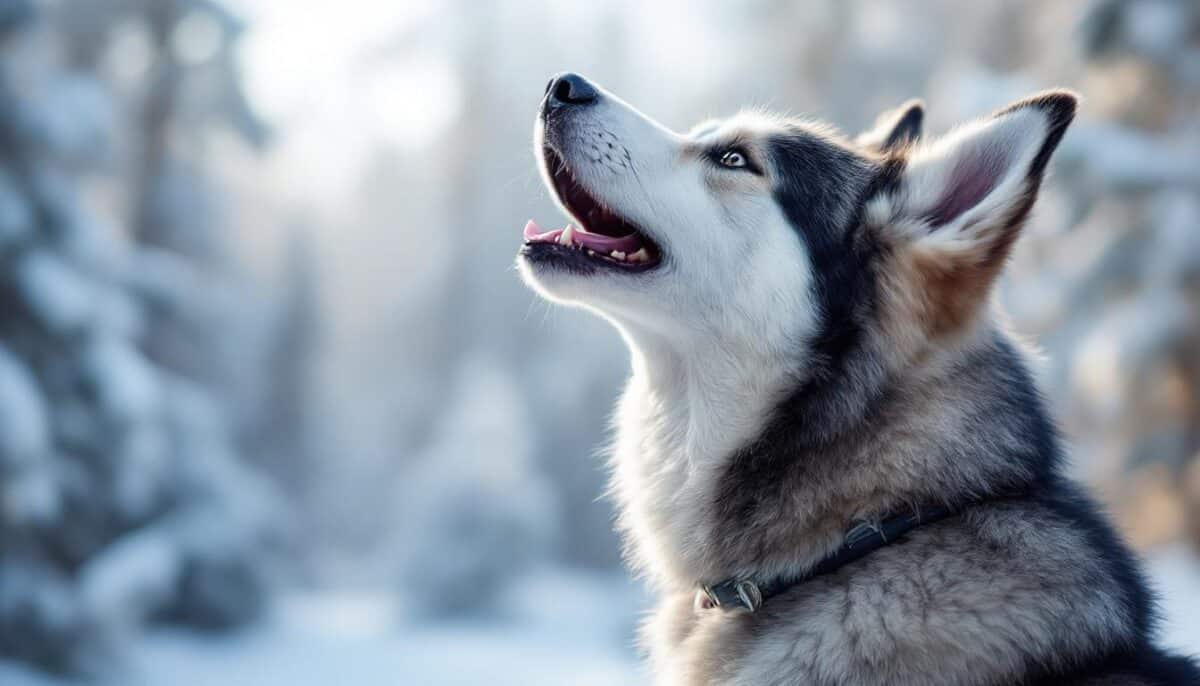There’s something almost otherworldly about the way Siberian Huskies howl. It’s not just noise—it’s a sound that seems to echo through time, stirring something deep within us. But have we ever stopped to wonder why they do it? It’s easy to assume it’s just instinct, but the real reason might surprise you.
Huskies aren’t like other dogs, and their howls carry a meaning far beyond what we might expect. There’s a hidden connection, a secret rooted in their history and behavior, that explains this hauntingly beautiful trait. Let’s uncover the truth behind their mysterious melodies—it’s not what you think.

Exploring The Unique Vocal Traits Of Siberian Huskies
Siberian Huskies are known for their extraordinary vocal range, almost like they’re part of some secret choir. They don’t just bark; they howl, yip, whine, and even “talk” in tones that can feel oddly conversational. It’s like they’ve mastered an intricate vocal language unique to their breed.
Their howling is believed to trace back to their wolf ancestry. While most dogs rely on barking to communicate, Huskies use howls to mimic the long-distance communication wolves once needed in the wild—a trait that’s both fascinating and practical.
What’s truly unique is how Huskies adapt their vocalizations for attention. Have you ever heard them “woo” when they’re excited or trying to express themselves? It’s their way of connecting with us, often mirroring human-like emotion through sound.
Interestingly, Huskies howl at triggers like sirens or music. Some researchers suggest they respond to specific frequencies as if drawn to harmony. This behavior highlights their heightened auditory sensitivity and instinct to join communal sounds.
We can’t talk about their vocal traits without mentioning the drama. Huskies love to exaggerate! Whether “arguing” with us or “protesting” a bath, their howling becomes a full-blown performance, cementing their reputation as a chatty, theatrical breed.
Understanding The Evolutionary Roots Of Howling In Huskies
Siberian Huskies’ howling is more than noise; it’s a window into their ancient legacy. Their haunting cries are steeped in evolutionary traits that link them to their wild ancestors.
Connection To Ancestry And Wolf-Like Behavior
Huskies howl because they’ve inherited this behavior from wolves. Howling was essential for wolves to rally their pack, defend territory, or locate lost members over vast distances in the wild. Even today, when Huskies howl, it’s like they’re tapping into this primal instinct. Their chilling calls carry a sense of wildness that reminds us they’re descendants of a deeply social, survival-driven lineage.
Communication Within The Pack
Huskies use howling to bond with their “pack,” whether it’s fellow dogs or humans. Just like wolves, they howl to strengthen connections or show loyalty. A Husky’s howl can signal its location or act as an emotional response to other voices. Hearing another howl or noise can trigger a chain reaction, creating a harmonized vocal symphony that reinforces their social ties, even if the “pack” is just us calling them home.
Decoding The Secret Reason Why Siberian Huskies Howl It’s Not What You Think
Siberian Huskies’ howls captivate us, but they’re not just auditory theatrics. Behind every haunting sound lies a deeper, more surprising connection to their emotions and environment.
Emotional Expression: Joy, Anxiety, Or Loneliness
Huskies don’t just howl at random—they’re voicing feelings we might overlook. A long, soulful howl can reveal loneliness, especially when they miss their “pack” (us or other pets). Short bursts of howling often signal joy, like welcoming us home. On the flip side, anxious howling arises when they’re stressed or uncomfortable. This vocal transparency makes them remarkably connected to their human companions. By tuning into their howls, we can better understand their emotional world.
Responding To High-Frequency Sounds Around Them
Huskies have an acute sensitivity to high-frequency sounds, and their howls often echo this natural gift. They’re known to respond to triggers like sirens, music, or even distant dog howling as if they’re participating in an invisible dialogue. This instinct harks back to their wolf ancestors who communicated across long distances. Next time a Husky howls at a passing ambulance, it’s not just a quirky reaction—it’s their innate ability to tune into frequencies we barely notice, connecting them to a broader soundscape.
How Environmental Factors Influence Husky Howling Habits
Siberian Huskies don’t howl just because of their instincts; their surroundings play an unexpected role in shaping this behavior. From interactions with living beings to responses to our actions, their howls reveal so much about their environment.
Interactions With Other Pets Or Animals
Huskies often howl when they interact with other pets or animals, mimicking the sounds of nearby dogs, cats, or even distant wildlife. This vocal mimicry reflects their pack-oriented mindset inherited from wolves. For instance, if a neighbor’s dog barks persistently, a Husky may respond with a long, drawn-out howl, joining in what feels like a cross-species conversation. Even small pets like birds or guinea pigs can trigger their unique vocalizations, as these animals pique their natural curiosity.
Response To Human Behavior And Cues
Huskies are surprisingly in tune with our words, tones, and even moods, often howling to mimic or respond to us. Raise your voice, laugh, or sing, and your Husky might eagerly “talk back” with a series of howls. This behavior bonds them to their human “pack” and shows their sensitivity to our energy. For example, when we cheer loudly during a funny video or argue passionately, they may chime in with a dramatic howl, amplifying the moment in their own melodramatic style.
Addressing Misconceptions About Husky Howling
Husky howling often leaves us fascinated, but misconceptions abound about why they vocalize so dramatically. Let’s separate fact from fiction and uncover the truth behind these hauntingly beautiful howls.
Myth: Excessive Howling Equals Bad Behavior
It’s easy to mistake frequent howling for a sign of disobedience, but it’s rarely about being “bad.” Huskies howl as a natural expression tied to their wolf ancestry, not as a rebellious act. Instead of viewing it negatively, we should see it as their way of communicating emotions, whether they’re lonely, excited, or responding to environmental triggers. Teaching them boundaries and offering consistent social interaction can help channel their vocal energy constructively.
Myth: Huskies Howl Out Of Aggression
Some assume a Husky’s loud, intense howling is rooted in aggression, but this couldn’t be further from the truth. Huskies are renowned for their gentle nature and howl primarily to convey messages or feelings—not out of hostility. Whether they’re joining in on a siren or welcoming us home, their howls are rarely confrontational. It’s a vocal celebration of life, not a threat, and understanding this helps us appreciate their unique temperament even more.
Tips To Better Understand And Handle Your Husky’s Howling
A Husky’s howl often feels like a window into their soul, carrying emotions, instincts, and stories. To make life with your melodious companion more harmonious, let’s explore ways to decode and manage this behavior.
Create A Routine To Reduce Anxiety
Establishing a consistent daily routine can work wonders for an anxious Husky. Regular feeding times, walks, and play sessions help them feel secure and reduce the likelihood of stress-induced howling. For example, if your Husky tends to howl when you leave home, a set schedule with a calming ritual—such as leaving a favorite toy or engaging them for a few minutes before departure—provides reassurance. Sticking to predictability lowers anxiety by helping them anticipate your movements, making their world feel more stable.
Train Positive Responses To Manage Excessive Howling
Teaching your Husky to associate calmness with rewards can reshape howling habits. When your Husky howls excessively, wait for a quiet pause, then immediately reward them with treats or affection. For instance, if a siren sets off a dramatic howl, redirect their focus with a command like “Quiet” and reward compliance. Over time, your Husky will connect being calm with gaining rewards, reducing unnecessary howling. Remember, patience and consistency are key when using positive reinforcement to tackle their vocal theatrics.
Conclusion
Siberian Huskies truly have a fascinating way of expressing themselves through their howls. These vocalizations connect them to their ancient roots while strengthening their bond with us as their modern-day pack. By understanding the deeper meaning behind their howling, we can better appreciate their unique personalities and emotional transparency.
Whether they’re responding to sounds, seeking attention, or simply sharing their feelings, Huskies remind us how beautifully complex and connected they are. Embracing their dramatic, chatty nature helps us build a stronger, more harmonious relationship with these incredible companions.


